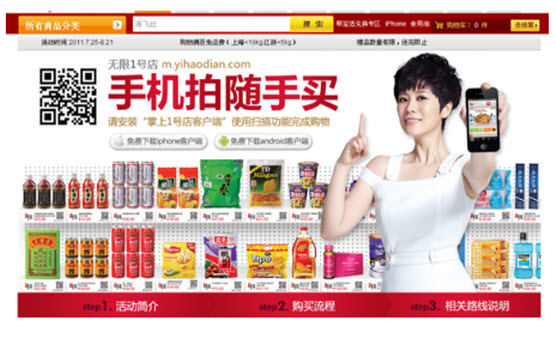Yihaodian aims to open 1,000 virtual supermarkets throughout China
Yihaodian, a Chinese e-commerce company, has announced the opening of 1,000 virtual stores throughout China. These supermakers will inhabit empty spaces within cities, but will not have any physical products stored within. Yihaodian will make use of augmented reality in order to accomplish this task, enabling consumers to access a massive, interactive database of goods. Once completed, this will be the largest virtual shopping network of its kind in the world and could help spark similar initiatives in other countries.
Company hopes to exploit rampant popularity of augmented reality
Yihaodian is not the first company to attempt to establish a virtual marketplace in the real world. Others have made use of QR codes or NFC tags to accomplish this task in the past, but have been met with only modest and short-lived success. Yihaodian hopes to exploit the rampant popularity of augmented reality as a way to provide consumers with high quality service and ensure that the virtual supermarkets get the attention they need to become a success.
Unlimited Yihaodian stores to be stocked with digital goods
The supermarkets will be called Unlimited Yihaodian. The virtual stores will be located in 1,200 square meter rooms that will have a digital stock of over 1,000 items. Consumers will be able to see these products using a smart phone equipped with an augmented reality application. Purchases can be made using Yihaodian’s e-commerce platform, enabling consumers to skip long lines and get what they want in an efficient manner. Like other virtual stores, consumers will receive their products in the mail after purchase, usually the following day.
Yihaodian may succeed where others have failed
Yihaodian had attempted to bring virtual stores into the mainstream using QR codes. This endeavor proved informative, but largely fruitless. The United Kingdom’s Tesco had also launched a similar initiative in South Korea, where consumers were able to make use of QR codes to purchase products. This too was short-lived, with Tesco quickly taking down the virtual storefront and pursuing other avenues of e-commerce.


